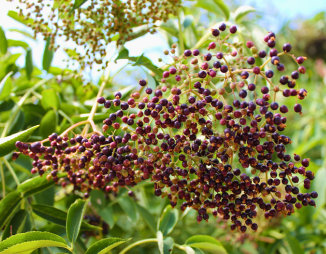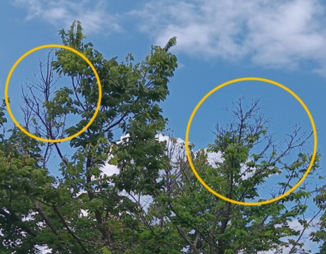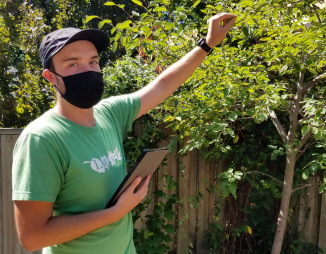
September 05, 2023
Doreen Malapitan
Did you know there are native shrub species in Ontario that offer a variety of delicious and healthy food not only for wildlife but for people too? Read on to find out how you can cook with native species!

August 18, 2023
Bracha S.
As a concerned tree lover, you might be curious about some ways you can assess the health of the trees in your neighbourhood. In this blog, we will be looking at some key indicators of tree health described in the Neighbourwoods Tree Inventory Protocol that we use when we assessed the health of the trees planted through LEAF’s Toronto Community Housing Corporation (TCHC) Planting and Stewardship Program. Read along and learn how you can observe the health of the trees in your own neighbourhood.

July 11, 2023
Guest Blogger
Tags: Community Programs
This past spring, I had the opportunity to work as the Naturalization Assistant at LEAF and support their community planting events. At these events, we worked with LEAF volunteers and community participants to plant 1,250 native trees and shrubs in Richmond Hill and King. I’m excited to share my experiences of seeing how different people came together as a community to make a lasting impact on the environment.

July 11, 2023
Jess Wilkin
Large-growing trees are an important part of the urban forest, but small yards can be overwhelmed by their presence. Often overlooked due to their size, small yards are a great opportunity to help grow the urban forest. The trick is knowing which plants to plant. Check out three alternatives to planting large-growing trees for your small yard.

June 28, 2023
Sarah G
Urban trees behave differently than their forested counterparts and need extra help to succeed. As temperatures rise and soils dry out, young urban trees need consistent watering to thrive.

June 28, 2023
Brenna Anstett
Ever wonder what it’s like to be the best at everything? The majestic bur oak can tell you! Not only is it one of Ontario’s largest growing and longest living trees (it can live up to 300 to 400 years!!), it’s also the most common, widespread, cold-tolerant (burrr!) and drought resistant of all native oak species in Canada. As if that wasn’t enough, its acorns (fruit) are among the largest of all native oaks. The bur oak is defi-nut-ly a true masterpiece!

June 14, 2023
Sarah G
As a homeowner, you may have already made the important decision to plant native trees and shrubs on your property. But did you know that LEAF offers free follow-up health assessments for LEAF-planted trees and shrubs? Read on to learn more!

May 31, 2023
Sarah G
Do you want to add some greenery to your yard but are worried about the lack of sunlight? Have no fear, LEAF is here to brighten up your day with several native shrubs that do well in lower light conditions.

May 08, 2023
Jess Wilkin
Privacy can come at a premium, but it doesn’t always have to! Privacy hedges can be a cost-effective way to create privacy while also greening your space. Check out our top four tips for creating the perfect privacy hedge in your backyard.

May 08, 2023
Justin Lewis
There are over 65 tree species that are native to Ontario, many of which you can see in our local urban forest. But did you know that there are 11 native trees that are officially classified as Species at Risk? Read on to find out more about these tree species, the reasons why they are at risk and what you can do to help native trees thrive instead of decline.
